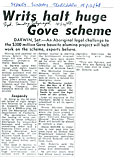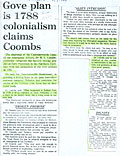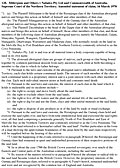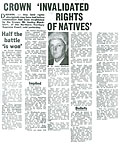A legal challenge
The Reverend Ron Croxford and Rev. Arthur Ellemor of the Methodist Commission on Aboriginal Affairs began exploring legal opinions regarding land rights for Aborigines in the Arnhem Land Reserve. By mid-1968, John Little, a young lawyer; Ted Woodward, a Queen's Counsel; and Frank Purcell, a member of the legal firm representing the Methodist Church, were working together to develop the grounds for a case.
In December 1968 the Yirrkala tribes launched a legal challenge against the Gove bauxite alumina project.
'Writs halt huge Gove scheme'
Sunday Telegraph, 15 December 1968
The following year, the Northern Territory Supreme Court began hearing the case brought by Mungurraway Mathaman and others, representing the clans of Yirrkala, against Nabalco and the Commonwealth government. [1] They sought injunctions, damages and declarations relating to the use and occupation of certain areas of the Arnhem Land Aboriginal reserve. [2] A public appeal for money to help fight the case was launched.
Despite his position as chairman of the Commonwealth Council for Aboriginal Affairs, Dr HC Coombs criticised the Commonwealth government for its dishonesty and the mining venture for its haste.
'Gove plan is 1788 colonialism, claims Coombs'
The Australian, 6 January 1969
Download 'Gove plan is 1788 colonialism, claims Coombs' [PDF 290kb]
In March 1970 the substantive case, Milirrpum and Others v Nabalco Pty Ltd and the Commonwealth of Australia, began in the Supreme Court of the Northern Territory. Plaintiff Milirrpum (head of the Rirratjingu clan), plaintiff Munggurrawuy (head of the Gumatj clan) and plaintiff Daymbalipu (head of the Djapu clan) brought the action on behalf of their clans. As well as representing the Djapu clan, Daymbalipu also represented the Marrakuli, Galpu, Munyuku, Ngamil, Wangurri, Djambarrpuyngu, Manggalili, Warramirri and Mardarrpa clans.
Milirrpum and Others, statement of claim, 16 March 1970
Document 128 in Bain Attwood and Andrew Markus, The Struggle for Aboriginal Rights: A Documentary History, Allen and Unwin, Sydney, 1999
Download Milirrpum and Others, statement of claim, 16 March 1970 [PDF 15kb]
The plaintiffs' action was against Nabalco which had secured a 12-year mining lease from the federal government. They argued that each clan held a proprietary interest in their communal lands. They asserted that their laws and customs gave them the right to occupy these lands, to exclude others from them, and to live off the plant and animal life of the lands.
Judgment
On 27 April 1971 Mr Justice Blackburn ruled against the Yirrkala claimants. He held that any rights which they may have had before colonisation had been invalidated by the Crown. The rights of the mining company were upheld and Nabalco was allowed to proceed with their mining operation unencumbered by the concerns of the Yirrkala people. Frank Purcell for the plaintiffs believed, however, that 'we have won half the case'. (See later section, Aboriginal Embassy, for a continuation of this narrative.)
Crown 'invalidated rights of natives'
The Sun (Melbourne), 28 April 1971
Postscript
The Yirrkala people did eventually receive title to their land in 1978 under the Aboriginal Land Rights (Northern Territory) Act 1976. However, the mining leases to which they had objected, were specifically excluded from the provisions of this Act. The years between the court case and the return of the land to the Yirrkala people saw the arrival of 4000 white Australian mining employees and their families. Their services, such as a supermarket and a hotel, created huge challenges to the culture and lifestyle of the Yirrkala people.
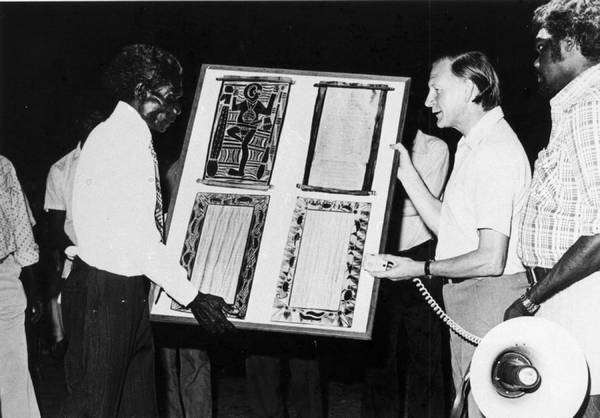
The Minister for Aboriginal Affairs, Hon. Ian Viner, presented the land title to Roy Marika in 1978.
Source: Northern Territory Library and Information Service
Related resources
Footnotes
1 'Writs May Block Gove Project', The Australian, 14 December 1968.
2 Mathaman was suing on behalf of himself and the other members of the Rirratjingu clan; Mungurrawuy on behalf of himself and others of the Gumatj clan; and Daymbalipu on behalf of the Djapu, Marrakuli, Galpu, Munyuku, Ngamil, Wangurri, Djambarrpuyngu, Manggalili, Warramirri and Madarpa clans. These were the names and relationships on the writs issued out of the Supreme Court of the Northern Territory on 13 December 1968. Arthur Ellemor, 'Outline of Yirrkala Land Rights Case, 2 October 1969', Barrie Pittock personal papers.
